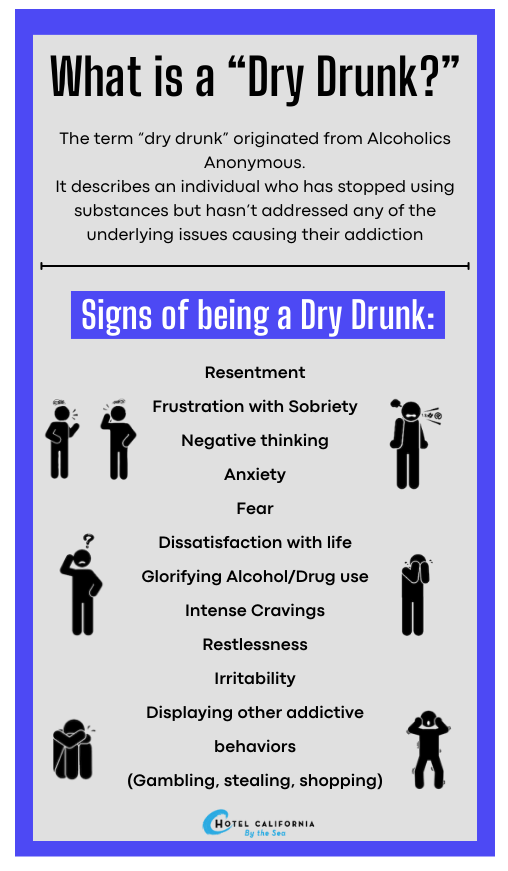What is a Dry Drunk?
Alcoholism and alcohol use disorder (AUD) is a difficult mental health condition to overcome. It can impact the body physically and mentally with lasting damage. It is a chronic and progressive brain disorder in which users misuse alcohol in an attempt to aid in temporary relief from unpleasant feelings. For some who have had severe cases of alcohol use disorder or have been abusing alcohol for a very long time, changing old habits and developing new healthy ones can be difficult. Sometimes, people can develop symptoms of dry drunk.

The term dry drunk refers to when a recovering alcoholic shows physical and psychological signs of alcohol use despite being sober. Someone who is experiencing dry drunk syndrome abstains from alcohol but continues to deal with the emotional and psychological impact associated with his or her alcohol addiction. It can also be any negative symptoms that fueled their addiction to begin with. Ultimately dry drunk syndrome can interfere with a successful recovery and sobriety journey.
What is a Dry Drunk?
Dry drunk syndrome is a term that originated from Alcoholics Anonymous (AA) that describes a person who has stopped drinking alcohol but still experiences the issues, behaviors and symptoms associated with their alcohol use disorder. It is a set of negative habits and behaviors that led to alcohol abuse and have persisted through recovery and sobriety. Sometimes it causes a person to act drunk or experience the same issues that initially contributed to their addiction. Today, the term dry drunk is seen as a stigmatizing term and isn’t as commonly used.
It is most commonly seen among those who quit their drinking habits without the help of an addiction professional support program, group or system. Oftentimes, people who have dry drunk syndrome quit drinking without properly confronting and treating the root cause of their addiction. People who experience dry drunk syndrome also usually do not receive any ongoing support or treatment for their AUD. Because of this, it could often be a sign of slipping back into bad habits and the possibility of relapsing. Others speculate that dry drunk behaviors are a sign that a person is not fully committed to their recovery.
Dry drunk syndrome can happen even when a recovering alcoholic has been sober for many years. It can hurt sobriety and make it easier to go back to the unconstructive habits of their alcohol addiction.

Signs that someone may have Dry Drunk Syndrome
Recognizing dry drunk syndrome isn’t always easy. It can be difficult for loved ones and family members of those with alcohol issues and sobriety because they may be accustomed to the behaviors and patterns expressed by the user. Because of this, they might not be able to see how it negatively impacts the user and his/her addiction to alcohol.
- Selfish behaviors and the act of self-importance by having all the answers
- Making harsh and insensitive judgments of oneself and others
- Characteristics of impatience and impulsivity
- Blaming others for their own faults
- Dishonesty and lying even about little things
- Having difficulty with important decision-making
- Experiencing mood swings and difficulty expressing emotions
- Fantasizing and daydreaming
- Cravings for alcohol and longing for a drink
- Feelings of detachment and self-absorption
- Getting bored, distracted and disorganized easily
- Refusing to attend and participate in addiction support groups or ongoing treatments
- Anger and negativity surrounding their recovery
- Isolation from others leads to increased depression and anxiety behaviors
- Resentment of others’ ability to meet their goals and one’s own ability to not drink like everyone else
- Anxiety about finding new goals and challenges for oneself and the future
- Fear of relapse
- Developing cross-addiction or dual-diagnosis behaviors
Who is more likely to experience Dry Drunk? What are the risks of developing Dry Drunk Syndrome?
- A person has stopped drinking alcohol cold turkey, managing to slowly wean themselves off the substance
- A person has not treated or allocated sufficient effort to healing the emotional and psychological issues that initially created the struggles with alcohol misuse.
Check Your Insurance Coverage for FREE
Find out if your insurance covers addiction treatment in minutes. We accept most insurance!
Post-Acute Withdrawal Syndrome (PAWS)
Some people consider dry drunk syndrome to be part of post-acute withdrawal syndrome (PAWS). PAWS are a collection of psychological and mood-related symptoms that occur after a person stops drinking or doing drugs. It is persistent and lingering withdrawal symptoms that can last for months after a person has stopped using substances. PAWS symptoms can last weeks, months and even up to a year.
Symptoms of PAWS
- Mood shifts
- Varying energy levels
- Irritability, frustration, anger
- Impatience
- Low confidence
- Tendency to judge and blame
- Difficulty with memory, learning and problem solving
- Anxiety
- Feelings of panic
- Alcohol cravings
- Difficulty sleeping
- Easily prone to stress
- Showing frustration with treatment
- Frequent daydreaming
- Dishonestly
- Dizziness
- Slowed reflexes
- Issues with balance and coordination
In some studies, researchers say dry drunk syndrome is a sign of drug relapse or puts the person at a higher risk for relapse. However, relapsing is in fact a normal part of substance addiction recovery. Each individual is different in his or her treatment and recovery. Relapsing can happen even when a person has been sober for a long time.
Reach out to Hotel California by the Sea
We specialize in treating addiction and other co-occurring disorders, such as PTSD. Our Admissions specialists are available to walk you through the best options for treating your addiction.
Treatment of Alcohol Use Disorder
Alcohol use disorder is an intense and dangerous mental illness. Recovery and sobriety can mean a lifelong process. However, being sober doesn’t necessarily mean a person is in active recovery. Recovery is the process of regaining possession or control of something that was taken from them and returning to a normal state of mind. When a person experiences dry drunk syndrome, they continue to experience abnormal attitudes and behaviors related to their alcohol addiction despite becoming physically sober. In other words, you have stopped drinking, but you still struggle with the negative and destructive feelings you experience during active addiction.
How can you get help for dealing with PAWS and dry drunk syndrome? Find a new and healthy hobby. Get physically healthy and commit to self-care. Connect with others who may have experienced the same things as you in support groups. Develop new coping methods. Show self-compassion. Turn to family, friends and loved ones for support. Seek out professional substance addiction support.
Professional behavioral health treatment programs such as Hotel California by the Sea provide specialized care in treating those who struggle with alcohol use disorder. We provide all levels of care including alcohol detox, inpatient residential, PHP and IOP outpatient programs. We offer rigorous evidence-proven treatments including CBT, DBT and EMDR therapy. Clients can expect customized treatment plans that include a combination of medication-assisted treatments and behavioral therapies to treat every aspect of addiction. Hotel California by the Sea is dedicated to helping clients by providing the tools and resources needed to achieve recovery and sobriety.
References:
https://www.cigna.com/knowledge-center/the-dry-drunk
https://www.medicalnewstoday.com/articles/dry-drunk-syndrome
https://www.healthline.com/health/dry-drunk
https://www.verywellmind.com/dry-drunk-syndrome-63281
https://www.psychologytoday.com/us/blog/heartache-hope/201105/is-there-dry-drunk-in-your-life
